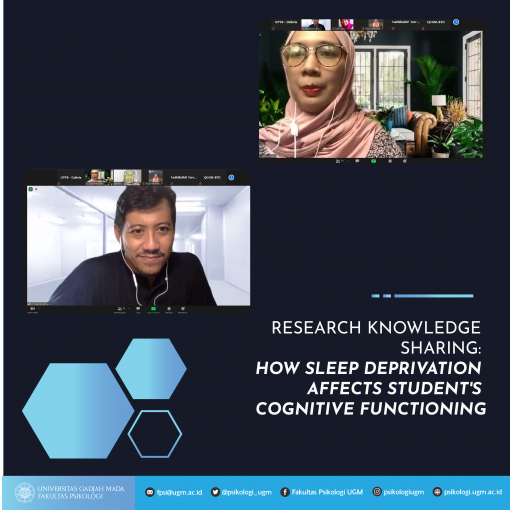
The Faculty of Psychology UGM through the Mind, Brain and Behavior Laboratory conducted a knowledge sharing session on Friday (30/4) which was delivered by Galang Lufityanto, M.Psi., Ph.D. This sharing session discussed the results of research with the topic “How Lack of Sleep Affects Students’ Cognitive Function”. This research is a research conducted during a pandemic and is part of the practicum agenda for Cognitive Psychology and Biopsychology I courses. This study involved 400 online participants with an experimental method.
Starting from a question, “can lack of sleep affect cognitive function?” which is then strengthened by data collected by the UGM Center for Innovation and Academic Studies (PIKA) through a survey held in early 2020 when start the COVID-19 pandemic get into in Indonesia. The survey found that 72.2% of respondents felt more flexible and relaxed as an advantage of online learning according to students. Meanwhile, 63.7% of respondents stated that the concentration that often decreases and the excessive workload (61.2%) are the deficiencies of online lectures according to students.
Then, the two things that were shortage from the lecture were considered by the research team as interesting things to study. Both of these things were also complained of being the cause of lack of sleep for students while undergoing online lectures during the pandemic. In addition, this phenomenon also raises a new term, namely covidsomnia, which has the potential not only to be experienced by students.
In addition, the research team also saw the reason why lecturers gave more assignments during online lectures, one of which was because lecturers were not ready to use e-learning facilities due to sudden changes that inevitably had to be faced. Lecturers unpreparedness in using e-learning facilities in the end resulted in many assignments aimed at maintaining the quality of the learning process, but unfortunately this made students sleep deprived.
If examined through theory, the phenomenon of lack of sleep has a bad impact, namely it can cause certain mechanisms that can physiologically increase cortisol levels as an indicator of stress. When these cortisol levels increase, stress increases which in turn can make a person experience depression if sleep deprivation persists for a long period of time. Whereas in the cognitive aspect, lack of sleep can cause the loss of certain neurons in the part of the brain responsible for memory, also known as the hippocampus. It will also reduce a person’s ability to pay attention and make decisions in the learning process.
The results found that the learning effects emerged when a task involved simple cognitive processing even during sleep deprivation. The learning effect did not occur when the task involved more complex cognitive processes under mild sleep disturbances.
